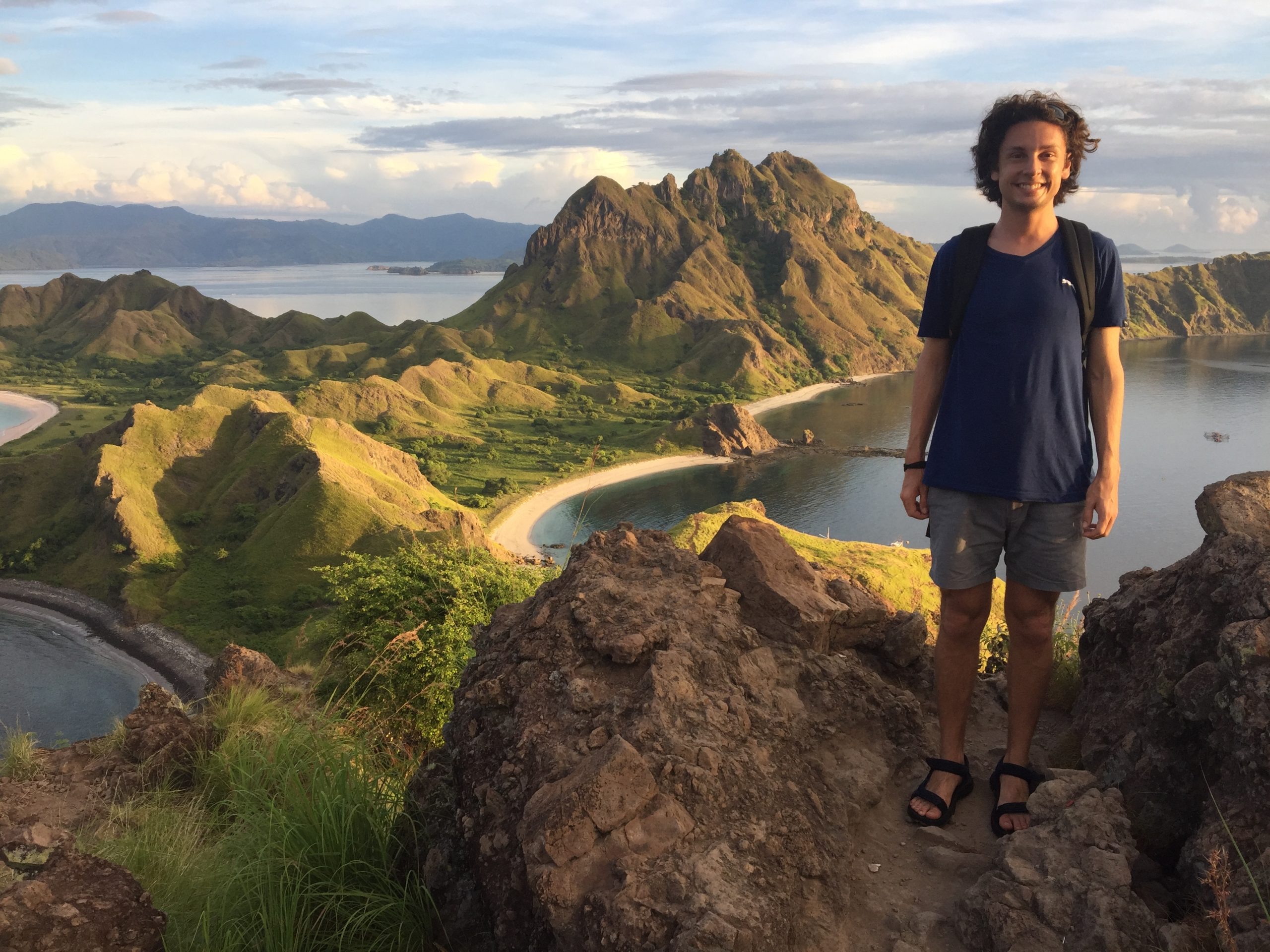
Michael Pashkevich talks about his research into spider ecology in the palm oil plantations of Indonesia.
Palm oil is here to stay, so we are learning to grow it in a way that is more friendly to native animals, but also doesn’t sacrifice crop yields.
Michael Pashkevich
Michael Pashkevich didn't like spiders when he was growing up, but at 11pm one night halfway into his undergraduate degree he found himself watching a golden orb weaver spider crawling up his arm.
A researcher had asked him if he wanted to help with her research into spiders and had invited him on a nature hike to get him acclimatised. “It was like a baptism of fire. I was torn between fascination and fear. I could see how calculating and intelligent the spider was, how it thought carefully about where to put its legs as it climbed upwards. It ‘humanised’ spiders for me,” says Michael.
Since doing his undergraduate thesis on the impact of deer conservation on a spider community in Louisiana, he has moved on to studying the effect of oil palm plantation management on spiders in Sumatra for his PhD.
Michael is part of the insect ecology group in the Department of Zoology. It is doing large-scale manipulation experiments with the aim of growing oil palm in ways that may benefit biodiversity without interfering with crop production. He says that there are many positives that accompany any negatives about the palm oil industry. Although the expansion of the industry has resulted in well-reported deforestation problems, Michael says oil palm plantations produce four to 10 times more oil per land unit than other oil crops and require fewer pesticides and fertilisers. “Palm oil is here to stay, so we are learning to grow it in a way that is more friendly to native animals, but also doesn’t sacrifice crop yields. We’d like to grow oil palm so that the beneficial functions of animals are protected and used to help crop production. For instance, protecting native pollinators will benefit oil palm pollination. We’d ideally like a win-win situation for both biodiversity and crop growth,” says Michael.
He began his PhD in 2017 and spent six months of this year in Sumatra collecting specimens. So far he has a collection of 10,000 spiders which he needs to identify. The spider community in the region is very diverse. Michael is looking in particular at the impact of maintaining trees around rivers when plantations are replanted. These conservation areas around waterways are called “riparian buffers” and help improve water quality; may reduce greenhouse gas emissions, and conserve animals and plants which might not otherwise survive in oil palm plantations.
Michael is collecting spiders in three locations – within riparian buffers, just outside the buffers and deeper into the plantation where the effect of the buffers will not be felt. He is interested in measuring how buffer quality – such as the types of trees planted within the buffer – contributes to conservation and to find out more about the benefits that buffers provide.
Early life and undergraduate studies
Michael was not always interested in ecology. In fact, he wanted to do genetics when he was at school. Born at an airforce base in Maryland, his family moved to Louisiana and then Japan for two years where he began school. When the family moved back to Louisiana he was eight. He loved maths and Biology at school and became interested in genetics. He also became involved in sustainable development and joined an environmental club where he helped to replant trees.
In his last year of school he worked on a sustainability project run by the local city council which involved students creating, implementing and measuring recycling initiatives and rolling them out in different parts of the city. It was his first introduction to policy work.
Michael [2017] applied to study Biology at university and initially sought out universities in the north of the US. For financial reasons, however, his parents encouraged him to look more locally. He was accepted to Loyola University in New Orleans on a full scholarship. It was to prove a good choice.
Having started with an interest in genetics, Michael attended a class on ecology halfway through his first year which was to change the course of his studies. The lecturer who took the class was inspiring and the fact that Loyola was a liberal arts college meant Michael's mind was open to different ways of thinking about scientific issues. He started to focus more on ecology. He was invited to take part in research on spiders and, although he was not a big fan of spiders, he was keen to work with the person leading the research. Just before a research trip, she invited him on the natural history hike where he encountered the golden weaver spider. It was a turning point for Michael.
A week later he went on an environmental research trip to Central America. The aim was to learn about scientific research methods on the ground, but during a 12-hour delay on the way back Michael had the time to draw up the proposal for his undergraduate thesis on how human-disturbed landscapes affected spiders, in particular how attempts to curb deer hunting in Louisiana had affected the ecological food chain. More herbivorous animals in certain areas had an impact on a host of other species, including the spiders who lived on the plants the deer were eating. The honours thesis project occupied the last two years of his degree.
Michael really enjoyed being involved in research and knew when he finished his course that he wanted to continue to research spiders in the tropics. He also wanted to experience studying in a different country. During his course he had done an exchange with Edinburgh Napier University and had found out more about doing a PhD in the UK. He liked the UK approach with its focus on independent research and Cambridge's insect ecology group seemed the best fit for his interests.
Michael, who has been a social officer on the Gates Cambridge Scholars Council, says he would not have been able to do his PhD without the support of a Gates Cambridge Scholarship. He says he is committed to producing research that has a tangible application. He has also been involved in science outreach for several years, working in the US on trying to get under-represented groups interested in STEM subjects and in Cambridge he has done public engagement work at the Zoology museum. He hopes to continue his work on ecology, to keep working in the tropics and to contribute to sustainable agriculture.

Michael Pashkevich
- Alumni
- United States
- 2017 PhD Zoology
- Jesus College
I am originally from Louisiana (USA), and grew up in the biodiverse and culturally rich greater New Orleans area. My PhD studies (Insect Ecology Group, Zoology Department) studied the effects of management of oil palm plantations on invertebrates and their ecosystem functions. This allowed me to spend 15 months of my PhD on fieldwork in Sumatra, Indonesia.
In October 2021, I started as the Marshall Sherfield Fellow in the Insect Ecology Group (Zoology Department, Cambridge). In this role, I am managing a new collaborative project that is assessing socioecological differences between Liberian land use systems, and identifying aspects of land management that can improve overall crop sustainability. I am also a junior research fellow at St. Edmund's College (Cambridge).
Previous Education
Loyola University, New Orleans
Links
https://www.zoo.cam.ac.uk/directory/michael-pashkevich-jr
https://www.marshallscholarship.org/marshall-sherfield/marshall-sherfield-fellows/mr-michael-pashkevich-jr












